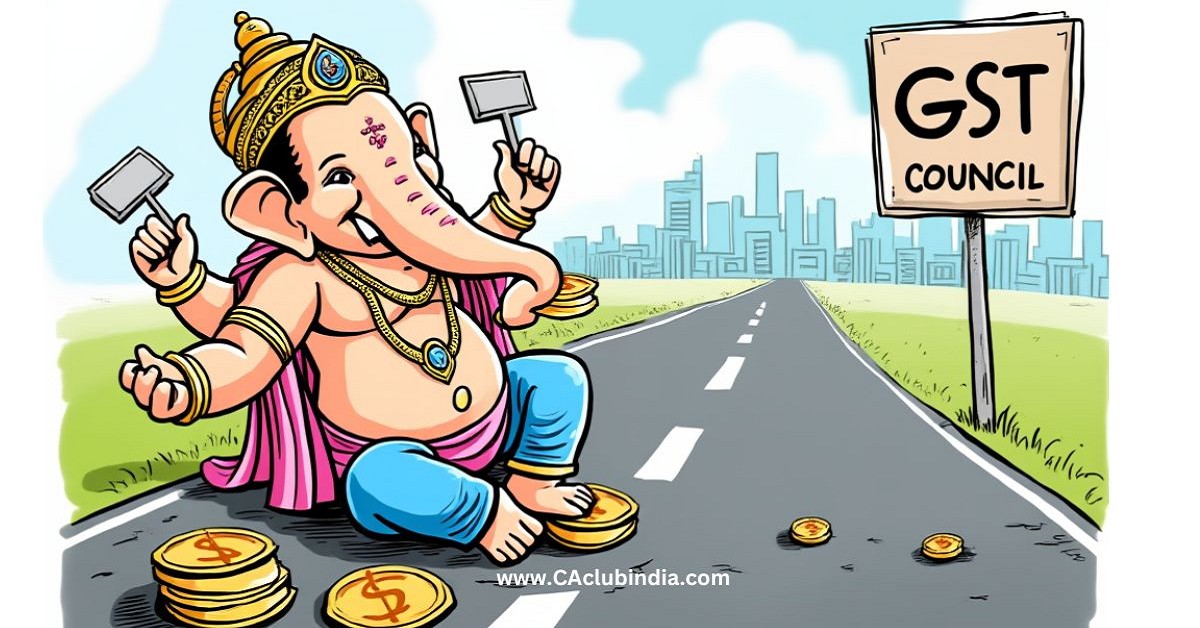Arjuna: Krishna, as the joyous festival of Ganesh Utsav comes to an end on Anant Chaturdashi, we are preparing for the farewell to Lord Ganesha. But as Ganesha removes our obstacles (vighnas), I wonder if he has also provided solutions to the hurdles in our taxation system, especially GST. Have there been any changes recently?
Krishna: Yes, Arjuna! Just like Lord Ganesha removes obstacles, the GST Council has made efforts to clear difficulties in trade, give relief to businesses and make compliance easier. During the 54th GST Council meeting on 9th September 2024, several helpful recommendations were made to ease the path for taxpayers and businesses. These changes can be seen as blessings from Lord Ganesha himself.
Arjuna: What are these divine-like recommendations, Krishna? How have they made GST compliance easier and given relief to businesses?

Krishna: Let me explain the key recommendations:
1. Reduction in GST Rates for Namkeens & Savoury Products: Just like the sweets we enjoy during Ganesh Utsav, the Council recommended to reduce the GST rate on savoury products like namkeens, mixtures, and bhujia from 18% to 12%. This makes them more affordable.
2. Lower GST on Cancer Drugs: The council recommended GST on certain life-saving cancer drugs like Trastuzumab and Osimertinib to be reduced from 12% to 5%. This brings significant relief to patients and their families.
3. Reverse Charge Mechanism (RCM) on Metal Scrap: Council recommended to charge GST on metal scrap sold by unregistered persons to registered buyers and will be paid by the recipient under RCM. The supplier will need to register once their sales cross the threshold limit.
4. Reverse Charge Mechanism (RCM) on Renting of Commercial Property: The council has also recommended to brought renting of commercial properties from unregistered to registered persons under the RCM.
5. Transport of Passengers by Helicopter: The Council recommends a reduced GST rate of 5% for shared helicopter rides. This will make such travel more affordable.
6. Waiver of Interest and Penalty under Section 128A: The Council recommends the introduction of the procedures and conditions for availing benefit of this section for FY 2017-18, 2018-19, and 2019-20. Taxpayers should make payment of tax till 31st March 2025 for the benefit of such waiver. Section 128A will come into effect from 1st November 2024.
8. Affiliation Services by Educational Institutions: To ensure fairness, the Council clarified that affiliation services provided by government boards to government schools are exempt from GST, but private university services are still taxable at 18%.
9. Composite Supply Clarifications: In the transport of goods, if services such as loading and packing are provided by a Goods Transport Agency (GTA) as part of the overall transportation, they will be treated as a composite supply and taxed as a single service under transportation. However, if billed separately, they will not be considered as composite supply and will be taxed independently.
10. B2C E-Invoicing Pilot Rollout: After successfully implementing e-invoicing for B2B transactions, the council is now starting a pilot project for B2C e-invoicing. This will improve compliance and transparency in retail transactions.
11. Enhancements to GST Return Architecture: New components have been recommended in the GST return system like RCM Ledger, Input Tax Credit Reclaim Ledger, Invoice Management System. This IMS allows taxpayers to accept, reject, or keep invoices pending for input tax credit.
12. Life and Health Insurance: The GST Council has recommended the formation of a Group of Ministers (GoM) to address GST issues related to life and health insurance. The GoM will submit its report by the end of October 2024.
13. Electricity Connection Services: The Council Proposes that Services like application fees for electricity connections, meter rental charges, testing fees, etc will now be exempt from GST when provided as part of the composite supply of electricity distribution.
14. Preferential Location Charges (PLC): The Council recommended that PLC paid for residential, commercial, or industrial complex construction before completion will be treated as part of the composite supply of construction services, attracting the same GST rate as construction services.
15. Research and Development Services: The GST Council has recommended exempting the supply of research and development services by government entities or research associations, universities, colleges, or other institutions notified in IT Act, 1961 using government or private grants.
Arjuna: Krishna, what should taxpayers learn from this?
Krishna: Arjuna, the key lesson for taxpayers from these changes is to always stay informed and adaptable. The recommendation of the introduction of new ledgers, B2C e-invoicing, exemptions etc. are all aimed at making compliance easier and more efficient. Most importantly, taxpayers should ensure that their tax filings are accurate and timely, as these changes are designed to remove the obstacles they face in their journey toward smooth and efficient compliance. Just as Lord Ganesha removes vighnas, these reforms offer a path to prosperity and clarity in the world of GST.






 CAclubindia
CAclubindia
